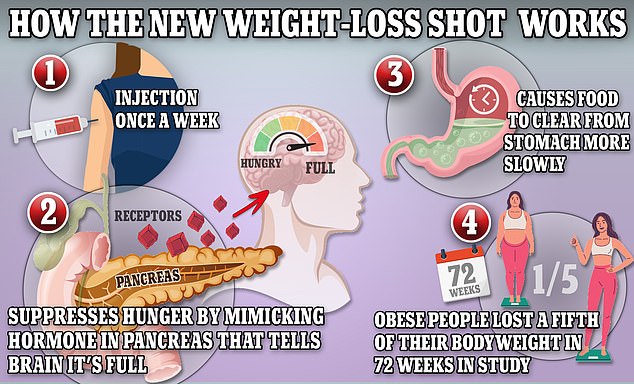Ozempic could make you BLIND, experts warn, as a disturbing study shows patients taking the drug are more likely to suffer irreversible damage to the optic nerve
People looking to lose weight were warned today that diet shots could cause a worrying eye condition that could lead to blindness.
Semaglutide, available as Ozempic and Wegovy, is seen as a monumental breakthrough in the fight against obesity.
But according to American experts, people with diabetes are prescribed semaglutide were four times more likely to be diagnosed with non-arteritic anterior ischemic optic neuropathy (NAION).
Overweight or obese people who took these drugs were seven times more likely to develop the condition, known as ‘eye stroke’, than people who took other weight loss drugs.
Researchers called the findings “significant but preliminary” and urged doctors to warn patients about the risks, especially if they have “other known optic nerve problems such as glaucoma.”
Ozempic is available on the NHS as a treatment to control blood glucose levels in people with type 2 diabetes. Last May it was also approved for weight loss under the brand name Wegovy and launched on the NHS in September for weight loss for overweight or obese patients with weight-related health problems.
Professor Joseph Rizzo, an expert in ophthalmology at Harvard Medical School said: ‘The use of these drugs has exploded in industrialized countries and they have produced great benefits in many ways.
‘But future discussions between a patient and their doctor should consider NAION as a potential risk.
“However, it is important to realize that the increased risk is associated with a disorder that is relatively rare.”
NAION, which affects about one in 10,000 people, occurs when the blood vessels that supply blood to the optic nerves become blocked.
Due to the loss of blood supply, the optic nerve no longer receives oxygen and the nerve becomes (partially) damaged.
But unlike other strokes caused by reduced blood flow, there is no weakness, numbness or loss of speech.
Most people suddenly experience loss of vision in one eye, without any pain. Patients often notice the problem when they wake up.
There are currently no treatments for NAION and vision often does not improve.
Researchers at Harvard University began investigating a possible link last summer after three patients taking semaglutide were diagnosed with the condition within a week.
They examined data from more than 16,000 patients from Harvard’s teaching hospital, Massachusetts Eye and Ear, who were treated over a six-year period.
Of these, 710 patients had type 2 diabetes, to whom 194 were prescribed semaglutide, and 979 patients were overweight or obese, to whom 361 were prescribed semaglutide.
In people with type 2 diabetes, researchers recorded 17 cases of NAION in patients prescribed semaglutide, compared with six cases in patients given other diabetes medications.
A three-year follow-up study found that 8.9 percent of patients receiving semaglutide were diagnosed with the condition, compared with 1.8 percent of patients receiving the other drugs.
Meanwhile, in overweight or obese patients, 20 NAION events occurred in people prescribed semaglutide, compared with three in patients given other medications.
About 6.7 percent of people taking semaglutide had NAION, compared with 0.8 percent with other medications.

Wegovy and Ozempic work by stimulating the body to produce a hormone called GLP-1 which is naturally released from the gut after meals
Writing in the diary, However, researchers at JAMA Ophthalmology acknowledge that the number of NAION cases is relatively small.
Professor Rizzo added: ‘Our findings should be seen as significant but preliminary, as more research is needed to investigate these questions in a much larger and more diverse population.
“This is information that we didn’t have before and that we need to include in the conversations between patients and their doctors, especially if patients have other known optic nerve problems, such as glaucoma, or if there is pre-existing significant vision loss from other causes.”
Graham McGeown, Honorary Professor of Physiology at Queen’s University Belfast, added: ‘This research does suggest a link between semaglutide treatment and a sight-threatening form of optic neuropathy, but ideally this would need to be tested in larger studies.
‘Given the rapid increase in the use of semaglutide and its potential approval for the treatment of a range of conditions other than obesity and type 2 diabetes, this topic deserves further investigation. However, potential side effects of the drug should always be weighed against its likely benefits.’
Novo Nordisk, manufacturer of Wegovy and Ozempic, has been contacted for comment.
It comes weeks after NHS England’s chief medical officer warned the drugs could be dangerous and should not be seen as a “quick fix” for people who “just want to lose a few pounds”.

It comes weeks after NHS England’s chief medical officer warned the drugs could be dangerous and should not be seen as a “quick fix” for people who “just want to lose a few pounds”. Professor Sir Stephen Powis (pictured) said the drugs should only be used to treat obesity or diabetes and should not be abused by holidaymakers looking to get “beach ready”, following growing concerns about people being treated in A&E after taking the medication.
Professor Sir Stephen Powis said the drugs should only be used to treat obesity or diabetes and should not be abused by holidaymakers looking to get ‘beach-ready’, amid growing concerns about people needing emergency care after taking the drugs.
These groundbreaking injections have been praised by the likes of Elon Musk and Jeremy Clarkson.
Ministers plan to distribute the drug to millions of obese Britons to help reduce the country’s skyrocketing benefits bill. Children could eventually get the jabs too.
Like all medicines, semaglutide can cause side effects that vary in frequency and severity, including nausea, constipation, diarrhea, tiredness, stomach pain, headache, and dizziness.
Some patients have also experienced hair loss while taking these medications.
The latest NHS data shows that 26 per cent of adults in England are obese and a further 38 per cent are overweight but not obese.
Experts point out that a lack of exercise and a poor diet high in processed foods are the main causes of the obesity epidemic in the UK.
